Department Profile
Department Establishment: 2008
Department of Nutrition & Dietetics has completed 13 years of existence proving its excellence in the field of Food Science, Nutrition and Dietetics and embossing its mark of success in promoting the girls’ education and creating awareness on health and nutrition. The department aims at empowering women with life coping skills and promoting economic independency by instilling entrepreneurial skills in them and to upheave the rural students by giving self – confidence and awareness about personal health and basic nutritional needs. The department ensures the creation of healthier generation by creating awareness on appropriate eating habits, behavioral knowledge and lifestyle patterns.
Vision
- Empowering women with life coping skills and promoting economic independency by instilling entrepreneurial skills in them.
- To lift up the rural students by giving self – confidence and awareness about personal hygiene and basic nutritional needs.
Mission
- Customize the course content in the teaching of nutrition and dietetics towards all round development of students.
- Equip the students with knowledge in the recent developments in the fields of Food Science and Nutrition.
- Inculcate good food and lifestyle pattern among students and public thereby produce generations of healthy and productive citizens for the country.
- Inculcate managerial and organizational skills both at home and work places.
| Name of the Programme | B.Sc., Nutrition and Dietetics |
| Duration | 3 Years |
| Intake | 40 |
| Eligibility | +2 |
PLOs -PSOs- PEOs
SYLLABUS 2023
Programme Educational Objectives (PEOs):
PEOs are broad statements that describe the career and professional achievements that the programme is preparing the graduates to achieve within the first few years after graduation. PEOs should be consistent with the mission of the Institution. PEO’s can be measured by a PLO/ PSO - PEO matrix. The PEO’s should evolve through constant feedback from alumnae, students, industry, management etc. It is mandatory that each PEO should be mapped to at least one of the PLOs.
The Graduates will be prepared to
PEO1: expertise in diet therapy and counseling, appraise the quality of food products as quality controller in food industries and imply their knowledge to opt higher studies.
PEO2: plan and prescribe the meal to meet the RDA and dietary modification based on the available resources and design value added food products to combat deficiency disorder.
PEO3: improve entrepreneurial and managerial skills in the field of food and nutrition and to build a healthy family and society.
Programme Learning Outcomes (PLO):
Programme Learning Outcomes are narrower statements that describe what students are expected to know and be able to do upon the graduation. These relate to the skills, knowledge and behaviour that students acquire in their study through the programmes.
PLO1: Disciplinary knowledge
Apply the knowledge of Arts, Science and Humanities to address fundamental and complex questions appropriate to their programmes.
PLO2: Critical thinking, Problem solving and Analytical reasoning
Make use of appropriate knowledge and skills to identify, formulate, analyze and solve problems in order to reach substantiated conclusions.
PLO3: Research related skills and scientific reasoning
Critically analyze research processes, products and practices with a view of strategic use of data in their field.
PLO4: Communication skills and Digital literacy
Demonstrate skills in oral and written communication and make use of ICT in various learning ambience.
PLO5: Team work and Leadership quality
Interact productively with people from diverse backgrounds as both leaders/mentors and team members with integrity and professionalism.
PLO6: Multicultural competence with Moral and ethical awareness
Defend the society against gender and environmental issues with moral and ethical awareness.
PLO7: Self-directed and Life-long learning
Formulate their own educational needs in a changing world in ways sufficient to maintain their competence and to allow them to contribute to the advancement of knowledge.
Programme Specific Outcomes (PSO):
Programme Specific Outcomes denote what the students should be able to do in their discipline at the time of graduation. They are programme specific. The PSOs should be mapped to all the specified PEOs.
By the completion of the B.Sc. Nutrition and Dietetics programme, the learners will be able to
PSO1: infer and summarize the knowledge and skills in the field of Home Science.
PSO2: analyze and assess the science of food, nutrients, food quality, nutritional status and manage diseases by diet therapy and intervention.
PSO3: extended learning to pursue higher education, research, teaching, entrepreneurship or render service in the government, public or corporate sector.
SYLLABUS 2020
Programme Outcomes (PO):
PO1: Disciplinary knowledge
Apply the knowledge of Arts, Science and Humanities to address fundamental and complex questions appropriate to their programmes.
PO2: Critical thinking, Problem solving and Analytical reasoning
Make use of appropriate knowledge and skills to identify, formulate, analyze and solve problems in order to reach substantiated conclusions.
PO3: Research related skills and scientific reasoning
Critically analyze research processes, products and practices with a view of strategic use of data in their field.
PO4: Communication skills and Digital literacy
Demonstrate skills in oral and written communication and make use of ICT in various learning ambience.
PO5: Team work and Leadership quality
Interact productively with people from diverse backgrounds as both leaders/mentors and team members with integrity and professionalism.
PO6: Multicultural competence with Moral and ethical awareness
Defend the society against gender and environmental issues with moral and ethical awareness.
PO7: Self-directed and Life-long learning
Formulate their own educational needs in a changing world in ways sufficient to maintain their competence and to allow them to contribute to the advancement of knowledge.
Programme Specific Outcomes (PSO):
By the completion of the B.Sc., Nutrition and Dietetics programme, the learners will be able to
PSO1: infer and summarize the basic skills of various cooking technologies.
PSO2: analyze nutrients, food quality and manage diseases using diet therapy.
PSO3: compare and contrast nutritive value for various food ingredients and enrich the quality of food by incorporation and fortification.
PSO4: create awareness on the importance of nutrition to the community and set up a computerized food service establishment.
PSO5: inculcate the spirit to work under hierarchy.
PSO6: adapt preservation techniques to use food resources appropriately to ensure food safety and security.
PSO7: extended learning and update on health to assert ideal body weight there-by avow self-health improvement.
PEO:
The Graduates will
PEO1: expertise in diet therapy and counseling, appraise the quality of food products as quality controller in food industries and imply their knowledge to opt higher studies.
PEO2: utilize food products based on the needs by proper food management and design value added innovative food products to combat deficiency disorder.
PEO3: improve entrepreneurial skills in the field of food and nutrition and to establish a food service outlet.
Faculty Details
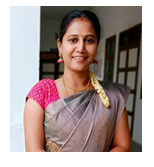
Dr.K.Jansi Rani
M.Sc., Ph.D. (NET)
Assistant Professor & Head
E-Mail jansirani-nd@sfrcollege.edu.in Area of Specialization Community Nutrition, Therapeutic Diet and Food science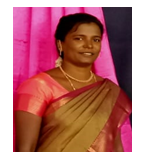
Mrs.J.Merlin Rani
M.Sc., (NET)
Assistant Professor
E-Mail merlinrani-nd@sfrcollege.edu.in Area of Specialization Nutrient Analysis, Biochemistry and Food Microbiology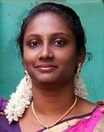
Ms.J.Mahalakshmi,
M.Sc., (NET), MBA.
Assistant Professor
E-Mail mahalakshmi-nd@sfrcollege.edu.in Area of Specialization Therapeutic Diet, Food Science and Community Nutrition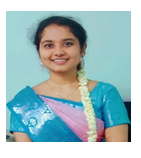
Ms.M.Fathima Aafreen
M.Sc, (NET), DMLT.
Assistant Professor
E-Mail fathimaaafreen-nd@sfrcollege.edu.in Area of Specialization Therapeutic Diet and Community NutritionRemarkable Activities
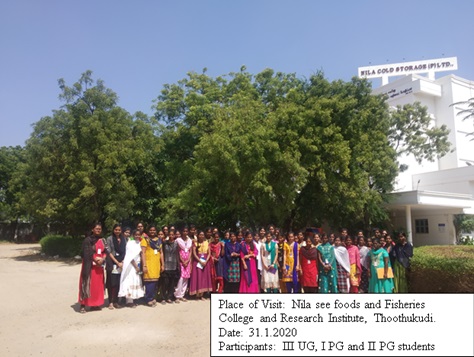
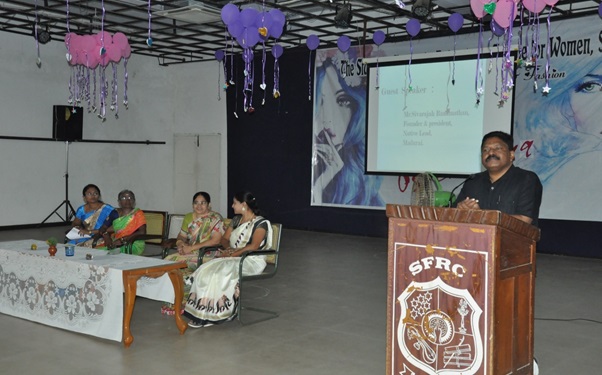
Mr.SivarajahRamanathan, Founder & President, Native Lead, Madurai, Mrs.K.Jansi Rani, Assistant & Head, Department of Nutrition & Dietetics, SFR College for Women,Sivakasi were delivered guest lectures on the topics “Opportunities for Starting Small Business” and “Teens Nutrition” on 21.01.2019
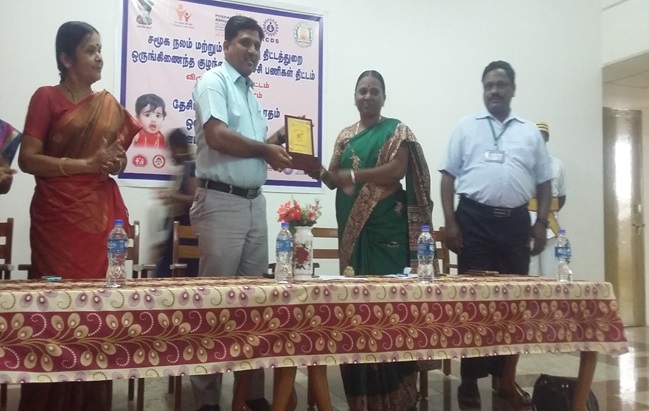
Mrs.Gandhimathi, CDPO, Department of Social welfare, Dr.Anuratha M.B.B.S., Dsitrict Food Safety Officer, Virudhunagar, Dr. V.K.Kathiravan M.B.B.S., D.C.H., Sivakasi, Mrs.R.Rajam, B.Sc., District Social Welfare Officer, Department of Social welfare, were delivered Guest Lecture on the topic " GOOD FUTURE WITH FOOD" on 19.09.2018.
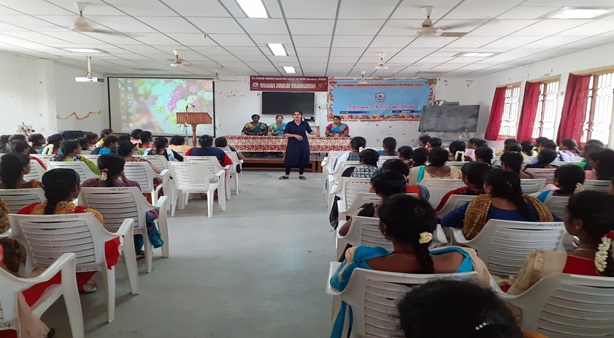
Ms.Varsha Ravi, Technical Head, R.K.Soya Foods, Sivakasi, delivered a Guest Lecture on the topic “Job Market” on 28.02.2020
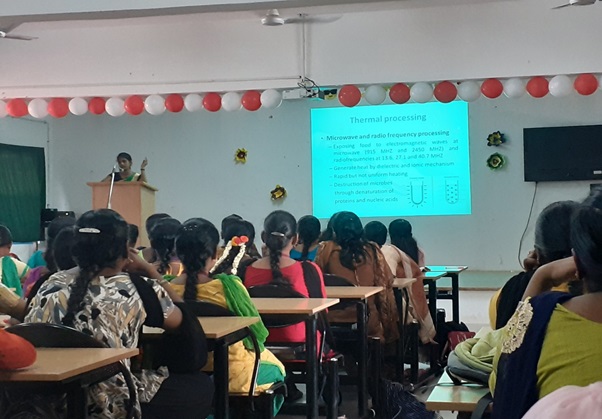
Ms. A.Sona,M.Sc, Assistant Professor, Dhanalakshmi Srinivasan College of Arts and Science for Women, Perambalur, delivered a Guest Lecture on the topic Emerging Trends in Food Processing on 30.01.2020
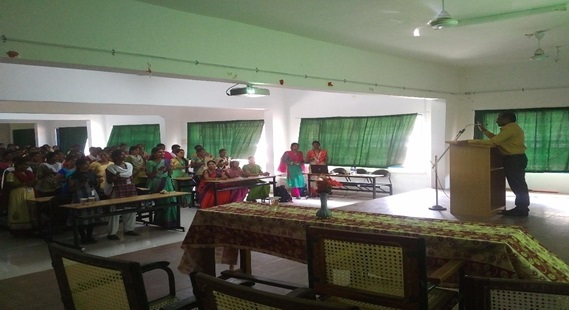
E.Enanala Periyar, Head and Assistant professor, Department of Criminology, delivered a Guest Leture on the topic “Public Safety and Health Campaign-Crime Awareness and Prevention” on 30.08.19
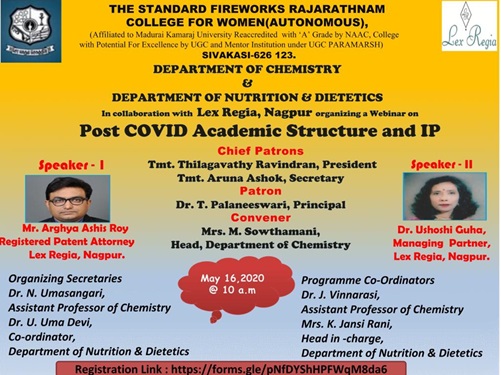
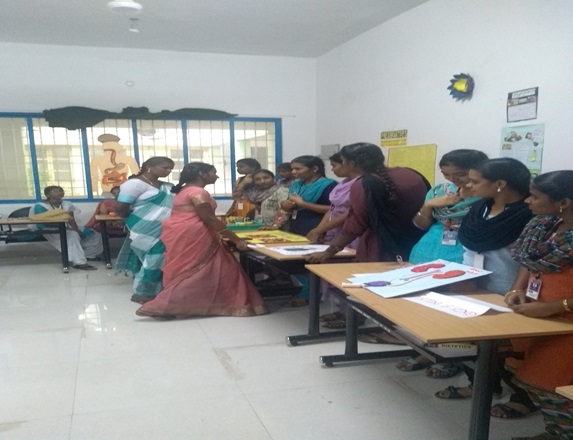
FOOD DAY CELEBRATION ( 16.03.2019)
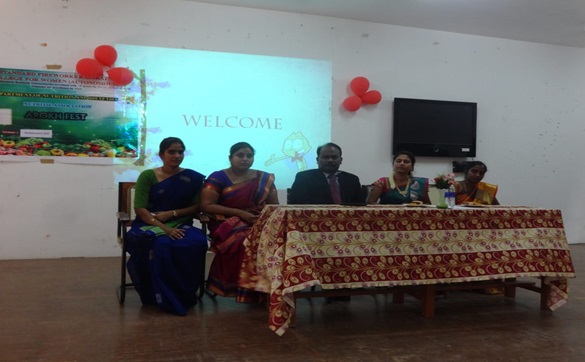
AROKE FEST ’20 – Intra-collegiate Competition held on 06.03.2020
Student Achievements
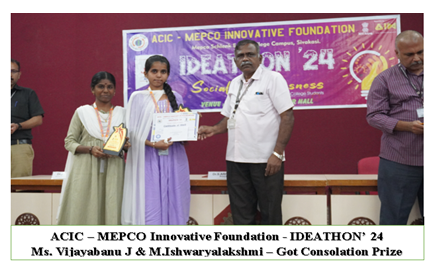
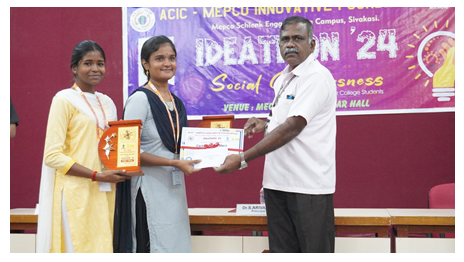
ACIC – MEPCO Innovative Foundation - IDEATHON’ 24 MS. Nava Shakthi B & Ms. Saarmila S – Got Ist Prize – Cash Rs.12,000/-
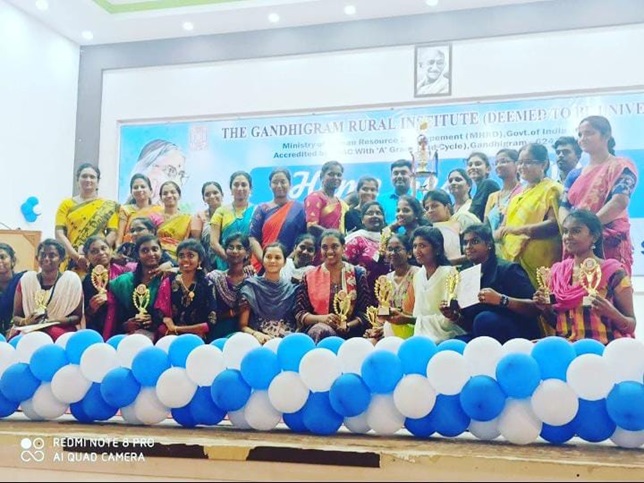
Overall Shield secured by the Students of Department of Nutrition and Dietetics, SFRC at Gandhigram Rural Institute, Dindigul, 2020.
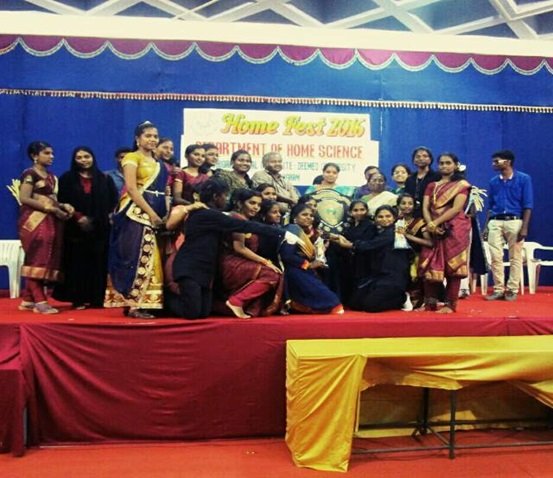
Overall Shield secured by the Students of Department of Nutrition and Dietetics, SFRC at Gandhigram Rural Institute, Dindigul, 2016
Contact Us
Thiruthangal Road , Sivakasi - 626123 , Tamil Nadu , India
Telephone Number
+91 4562-220389 FAX Number
+91 4562-226695 Email ID
sfrc@sfrcollege.edu.in
